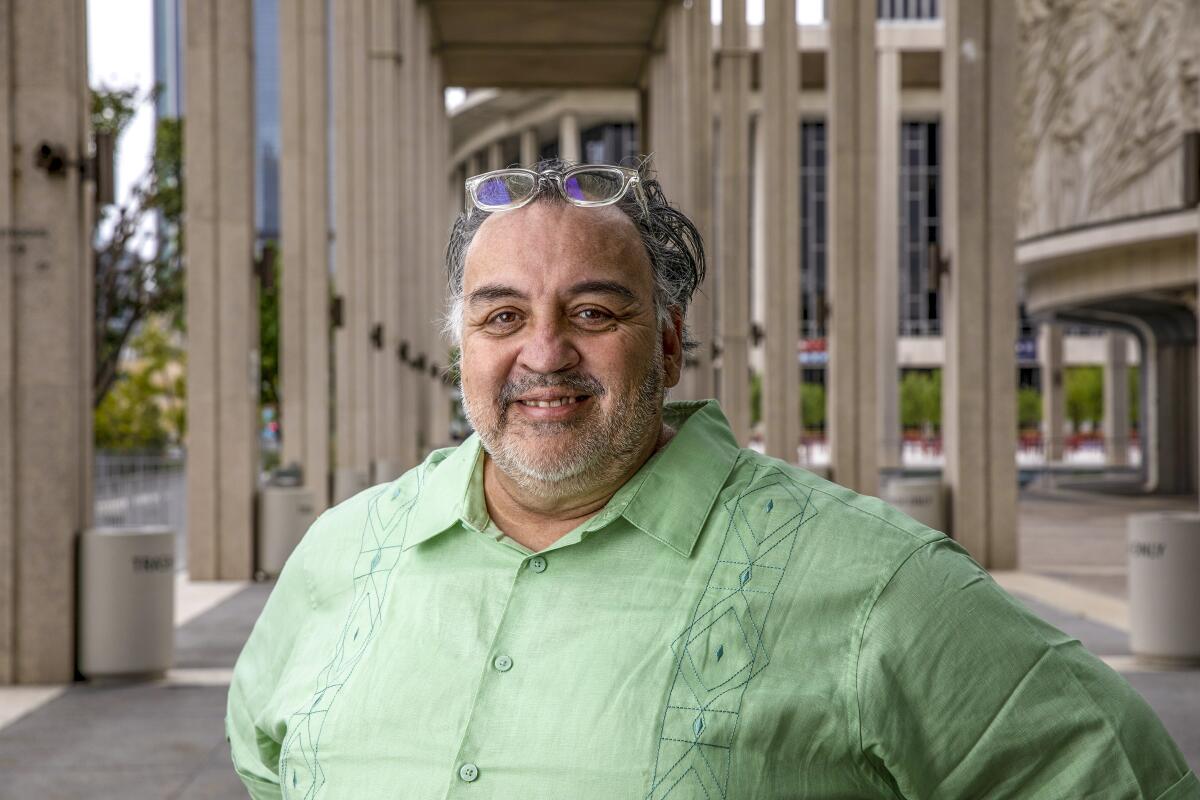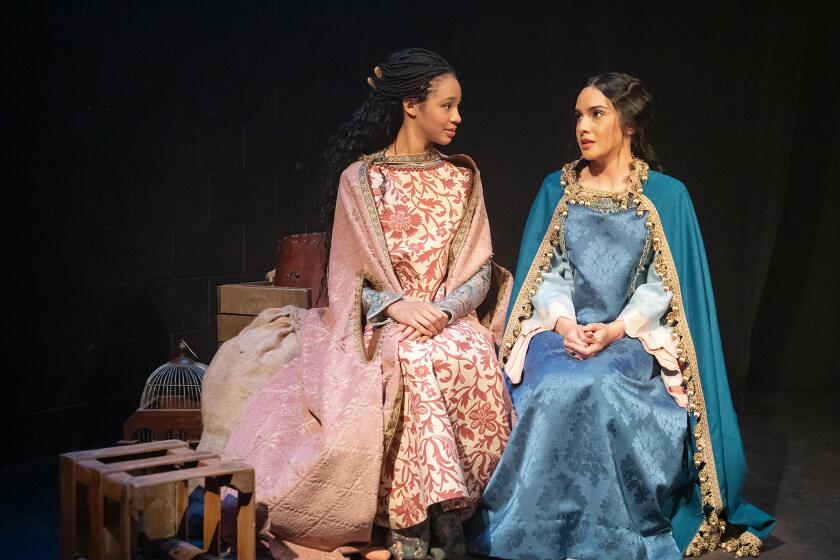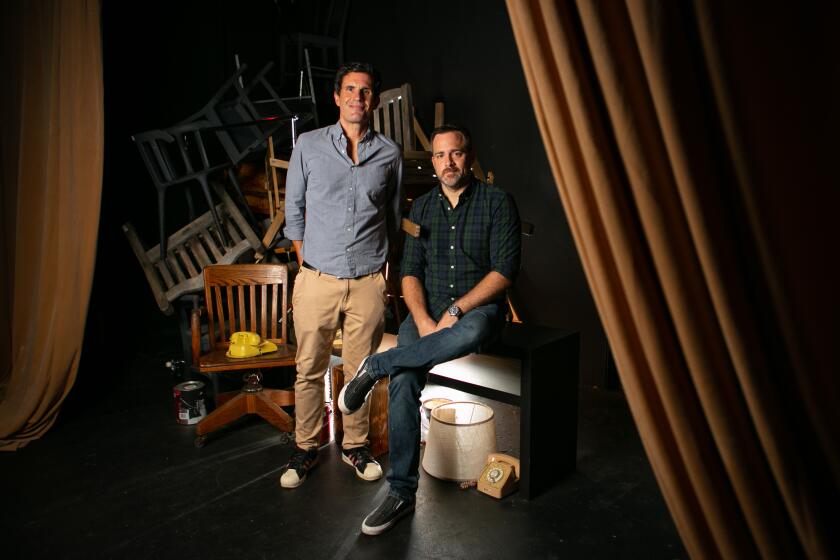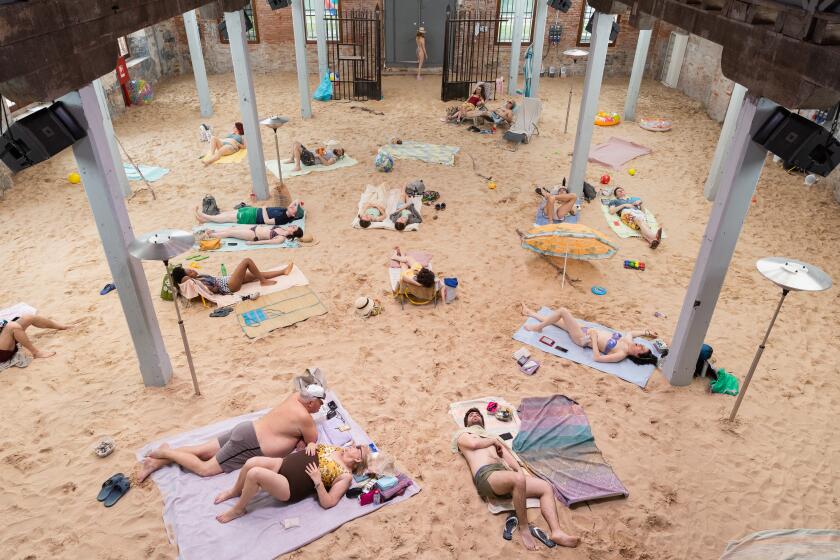How playwright Luis Alfaro aims to make L.A. the center of the theatrical universe

Playwright Luis Alfaro isn’t sure how much time he has to transform Center Theatre Group, but he’s not letting uncertainty stand in his revolutionary way.
He was named an associate artistic director of Center Theatre Group a little more than a month after Michael Ritchie, the organization’s artistic leader, announced his retirement (effective at the end of this year). Joining a lame-duck administration has obvious limitations, but Alfaro sees possibilities for initiating the kinds of structural reform that have to be implemented regardless of who’s in charge.
“The work that needs to be done is the work that needs to be done now,” Alfaro said on a recent morning Zoom call enlivened by his talkative ebullience. “I’ve always said with any job I’ve ever had that it could end tomorrow or in a year or it could end whenever it ends. I’m OK with all of it. I think it’s important to think about the theater with that kind of fluidity because if you’re going to have a life in the theater, you have to be willing to accept how things move and change.”
His dream is for Center Theatre Group to represent the rich diversity of his native city and to embrace Los Angeles’ stature as a world capital. To these ends, he wants the stages of the Ahmanson Theatre, the Mark Taper Forum and the Kirk Douglas Theatre not only to reflect Los Angeles but to guide how “this global center on the nation’s western edge” thinks about itself and its future.
“I came to CTG at this moment because a pandemic shifted a change,” he said. “The death, the murder, of George Floyd initiated a meditation, a conversation, an examination that has really shaken this company from the inside. When I joined this company, everybody was focused on the equity, diversity, inclusion work. Accountability. There was a BIPOC letter of demands that is still being responded to. But you have to shift not just the way people work. The structure, the architecture itself, has to be shifted in order to reflect the city.”
The notion that L.A. would consider itself ancillary to New York — a second city (were that designation not already taken by Chicago) — is anathema to Alfaro. There’s too much untapped potential, theatrically and culturally, for the town’s flagship theater organization to exist as a Broadway clearinghouse.
He speaks of the theater in spiritual terms. Representation and community are central tenets in his creed. By bringing new artistic souls into the building, he believes CTG will be better able to discover its 21st century aesthetic identity. Cultural redemption is the promise.
Dominique Morisseau, the Go-Go’s musical, a Liza Minnelli-Aristophanes mashup and — at long last — “The Band’s Visit”: your guide to the new season.
In an Instagram post on his appointment, Alfaro, who is keeping his position at USC as an associate professor of dramatic writing, shared how the job came about. “A few months ago, I wrote a letter to Michael Ritchie, artistic director of Center Theatre Group at the Music Center, and my complaint turned into a proposal for solution. Today I joined CTG as an associate artistic director. This is full of irony & déjà vu.”
The irony has partly to do with Alfaro’s unique history at CTG. When Ritchie became artistic director, he wanted to take new play development in a different direction. One of the first (and highly controversial) things he did was eliminate the theater labs for Latino, Asian, Black and disabled writers. Alfaro, who was the director of new play development and ran the Latino Theatre Initiative with Diane Rodriguez, was ousted. Returning at the tail end of Ritchie’s tenure is as sweet as it is strange.
The déjà vu part has to do with Alfaro’s deep roots. “I’ve been a part of this institution since I was a child, having grown up downtown,” he said. “My first four plays were at the Music Center. I was an usher there. I performed there and then came back to work there. So if I’m going to be critical of the institution, I should also be involved in making sure that I’m helping to change the institution in whatever way it needs to be changed.”
Alfaro is diplomatic in his remarks about Ritchie. “I’m never going to talk about bad about Michael because he has been so kind to allow me to come in and say, ‘This is what you need.’ And not once did he say no to any of it. I’ve never been to his house for dinner or anything like that. I know him as a wonderful colleague. I have been brutally honest, and he’s been very kind to take in the information and allow me to do what I’m doing.”
Full of affection (and a touch of nostalgia) for the passionate example of Taper founder Gordon Davidson, Alfaro praised Ritchie’s administration for sustaining the company amid so many spiraling crises. But he wasn’t hesitant about naming what’s been lacking — a focus on developing Los Angeles-centered work.
“I’m bringing festival back to the theater, a new play festival that is a celebration of new work,” he announced with glee. (CTG’s New Work Festival was essentially dismantled when Alfaro was shown the exit in 2005.) “I could sit with a lot of grievance and I could sit with a lot of judgement, but that’s not my job right now,” he said.
For Alfaro, the No. 1 priority is widening that pipeline of new play development. “A theater is best expressed by the work it initiates,” he said. “I think it’s really important that we not just bring in the great work but that we make the great work. We haven’t even begun to express the city and its fullness.”
Not that he isn’t appreciative of the way the organization has embraced him as a writer. Last year, he was named a member of the CTG Creative Collective, a newly formed group of artists engaged to explore what theater can be during the pandemic, and his Greek trilogy (“Oedipus El Rey,”“Mojada” and “Electricidad”) was presented as a series of readings on CTG’s digital stage in partnership with the Getty.
Yet he knows that more can and must be done. “I’m not the artistic director,” he was careful to acknowledge. “I joined a group of cohorts, but I will say I have opinions.”
Determination too. The first thing Alfaro did is take over the L.A. Writers’ Workshop, a Center Theatre Group forum in which a group of local playwrights spend a year or so developing new work while getting feedback from one another and the artistic staff. He called this “the heart and soul of the company.”
“It’s the spiritual center, so it felt really important to me that the writers’ group would be reimagined,” he said.
He expanded the playwriting membership from seven to 10. (“All women,” he noted with pride.) On the first day, something emotional happened.
Alfaro conjured the moment as if setting the scene for a new play: “I said something intentional is going on. I want us to see who’s in the room. And now I want us to consider who is not in this room. For me a couple of things popped. The important Central American voice in Los Angeles is one that we have not begun to capture. And the other is the really strong Asian voice that we have to reflect and make a bigger deal about. There’s a movement going, and nobody is writing about the Asian American female writers in this country who are extraordinary.”
His approach to new play development is centered on artists rather than on product. “We don’t need to find the Pulitzer Prize-winning playwright of this year,” he explained. “We need to find the one who is five plays away from that Pulitzer.”
Emergency pandemic grants kept them alive, but now what? With the fall season in flux, theater companies face the prospect of moving or shutting down.
Drawing on his own extensive experience in the American nonprofit theater, Alfaro wants artists to become more engaged with the companies they are invited into. “When I do a residency, it’s not like I sit by the pool to write my play,” he said. “I’m going to join a staff for 12 hours a day, to change what is going on inside the institution, to disrupt the way it does its work.”
Two areas he finds especially urgent: audience development and board recruitment. Diversifying who attends and who controls the purse strings has turned him into a self-described regional theater “activist.” He’d like playwrights, directors, designers and actors to follow his example and help create the institutions they wish to be part of.
He thinks theaters should be less transactional in their orientation toward artists. “It’s our job as curators to find and recognize the talent that already exists in the city and to create consistent relationships,” he said. “The hope and the dream” is that you create artistic homes “because that is how you make great work.”
Something CTG could do immediately, he said, is renew its relationships with Los Angeles actors. He also proposed resident directorships for Bart DeLorenzo and Jennifer Chang (with a facial expression that exclaimed “no-brainer”). And he spoke about an initiative for emerging designers, who can give form to how a new generation sees the world.
Alfaro praised the richness of regional theater in Southern California but noted that the leadership is still overwhelmingly white and male. “The majority of the population is not reflected at all,” he said. “That is erasure. How do we create a generation of representation that reflects the region and allows us to explore the richness of what’s going on here?”
So will he be throwing his hat in the ring for the artistic director job? Breaking out into laugher, he said that someone had just asked him the same question. He more soberly offered that his objective is to be of service for CTG at this critical crossroads, but the glint of possibility in his eyes was unmistakable.
Alfaro is brimming with ideas, but what can be realistically accomplished after such a protracted shutdown, with so much uncertainty on the horizon?
“This is a conversation that I’ve been having for 30 years,” he said. “In the moment when we are most in struggle is the moment when you either retreat or take the larger risk. I don’t think we have anything to lose, other than a lot of money. And frankly, what’s the point, if you’re sitting there with a theater that’s not alive.”
MOCA, the Hammer Museum and CAP UCLA are presenting “Sun & Sea,” a climate-change musical spectacle that won top prize at the 2019 Venice Biennale.
More to Read
The biggest entertainment stories
Get our big stories about Hollywood, film, television, music, arts, culture and more right in your inbox as soon as they publish.
You may occasionally receive promotional content from the Los Angeles Times.














